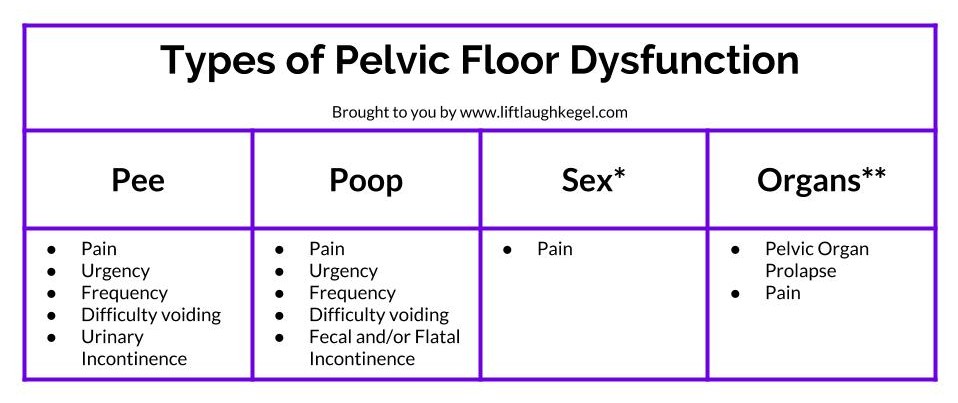Glad you asked! But first, you should reach about pelvic floor anatomy so that this post will make more sense. Go ahead, I’ll wait.
Okay, you’re back! Or just a smarty pants ;-)
So, simply put:
Pelvic floor dysfunction (PFD) refers to any issues with pee, poop, sex, or pelvic organs.
What specific issues? This handy chart gives you an overview of the problems.
* There may be other problems related to sex (such as low libido) which are not a pelvic floor problem
** There are many other conditions specific to the pelvic organs, gastrointestinal system, etc
Oftentimes, PFD is referred to by the technical, medical name for the condition, such as painful bladder syndrome, endometriosis, etc. However, the main issue is the same: there is a problem with the normal function of the pelvic organs and/or muscles. Prolonged problems with one can also cause secondary problems in the other.
For example, bladder pain may lead to increased activation of the pelvic floor muscles. Excessive pelvic floor muscle tension can cause urinary urgency. You can see how this creates a negative cycle if not addressed.
Issues outside of the pelvis can also contribute or result from PFD. For example, women who experience pain during sex may experience decreased libido, anxiety, and/or depression.
Also keep in mind that:
→ PFD can occur in anyone (not just women!)
→ Can occur in women who have never had children
→ Is more likely to occur with during pregnancy/postpartum
→ May occur after injury/trauma to the pelvis
→ Becomes more common as we age
And last but not least…
PFD is totally treatable!
There are many treatment options for PFD, including pelvic floor physical therapy. People with PFD may benefit from working with a team of providers including a medical doctor (urologist, urogynecologist, pelvic pain specialist], a pelvic floor physical therapist, nutritionist, health coach, etc.
If you are experiencing any of the above issues, get started on your healing journey by finding a pelvic floor physical therapist near you.










